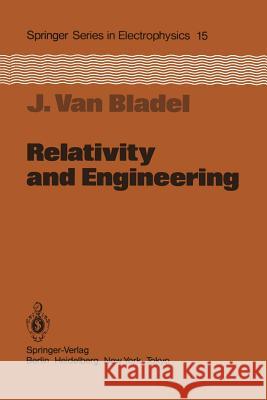Relativity and Engineering » książka
Relativity and Engineering
ISBN-13: 9783642692000 / Angielski / Miękka / 2012 / 402 str.
The main feature of this book is the emphasis on "practice." This approach, unusual in the relativistic literature, may be clarified by quoting some problems discussed in the text: - the analysis of rocket acceleration to relativistic velocities - the influence of gravitational fields on the accuracy of time measurements - the operation of optical rotation sensors - the evaluation of the Doppler spectrum produced by the linear (or ro- tional) motion of an antenna or scatterer - the use of the Cerenkov effect in the design of millimeter-wave power generators - the influence of the motion of a plasma on the transmission of electrom- netic waves through this medium. A correct solution of these (and analogous) problems requires the use of re lativistic principles. This remark remains valid even at low velocities, since first-order terms in (v/c) often playa fundamental role in the equations. The "applicational" approach used in the text should be acceptable to space engineers, nuclear engineers, electrical engineers, and more generally, ap plied physicists. Electrical engineers, in particular, are concerned with re lativity by way of the electrodynamics of moving bodies. This discipline is of decisive importance for power engineers, who are confronted with problems such as - the justification of a forcing function (-D /Dt) in the circuit equation of a moving loop - a correct formulation of Maxwell's equations in rotating coordinate systems - the resolution of "sliding contact" paradoxes - a theoretically satisfying analysis of magnetic levitation systems."











